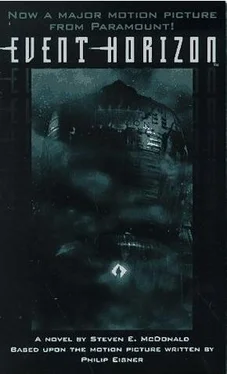Starck glanced at her board, then back at Miller. “We’re past the outer marker. We can engage the ion drive whenever you’re ready.” Miller liked Starck’s intelligence, but had never gone so far as to express that to her, for fear that she would take offense. Starck had never been particularly approachable.
Miller turned his attention to the other stations in the lower section of the bridge. The boards for the ship’s systems and mission stations were down there. Some folks referred to this part of the bridge as “the pit.” Miller had never approved of the term, and no one on his crew used it. Such terms tended to generate negative moods, and he wanted as few of those as he could get on long hauls. The crew instead referred to it as the “war room,” a term he let slide.
“Justin?”
Justin looked up, eyes shining. “Everything green on my boards, Skipper.”
He waved a hand over his instruments with a casual air that Miller figured would be gone in another ten years. Justin was fresh-faced still, despite the pallor that the media liked to call Spacer’s Tan. At least Justin had some excitement about this mission. Everyone else was bitching about having to pull another long haul;
Neptune. Better be something awfully important out there. Justin was waiting, watching him with the eager intentness of a puppy. He took another look at his own boards, then turned back to his bridge crew. “Start the countdown.”
There was a bustle of activity. Readouts on several monitors changed to show a digital clock.
Starck said, “Ion drive will engage in”—a pause, while she waited for status lights to change on her boards— “T-minus ten minutes.”
“Let’s go.” Miller released his restraints and rose carefully from his chair. Below him, Justin was rising from his seat, clearing a space. Miller swung around onto the ladder that connected the two bridge sections, covering the distance in a fireman’s slide. Smith and Starck followed him down, Smith climbing in that stiff way of his, Starck sliding down.
Miller ducked and turned through the hatch from the war room, his crew following him through the ship, into the main airlock bay. By that time they could have found it by following the sound of something akin to music. There was a jambox at the end of the tunnel, rather than a light, and it was jacked up to earbleed level, making the walls thrum in distressed sympathy with the beat. Along the walls of the bay was a row of extra-vehicular activity suits, stowed neatly, impervious to the pounding rhythm.
Miller came through the hatch looking like angry thunder, his entourage behind him. Before he had even focused on the sole live occupant of the bay, he was snapping, “Kill it!”
Cooper, tall, black, and bald, barely missed a beat, swinging around and stowing a freshly wrapped safety line in a storage locker. He high-stepped to another storage locker, hitting the power switch on the jambox that had been built into the top. No wonder the damned thing was so loud, Miller thought, as Cooper fell in with the others; the jambox speakers were using half the ship as a resonant chamber.
“Time to play Spam in the can,” Cooper said, grinning ear-to-ear at his captain’s back, his tone sarcastic.
Miller did not waste his time looking back. “Don’t start with me, Coop,” he snapped, and smiled inwardly as he heard the tone of Cooper’s footfalls change. Cooper had smartened up immediately, unconsciously adopting a military posture and gait. Miller was glad he could count on his crew to maintain standards when necessary.
They continued onward to the crew quarters. Everything had been stowed for docking, bunks folded up, chairs and tables put away in their cubbies, the vid units locked down, even the galley cleaned up and cleaned out. They had been restocked for this mission, but had not yet had time to get things into the usual state of a long-haul galley, a situation that was a relief to Miller, who only tolerated the mess because it was particularly bad for morale to be thoroughly iron-handed. As long as they played the game according to the unwritten rules, cleaning up after themselves every couple of days, he was content to let things slide.
Peters was crouched down at floor level, an access panel pulled up and placed to one side of her while she worked, loading carbon dioxide scrubbers into the ventilation system backup. That had been part of the restocking situation too. When the orders had come down from On High, the maintenance crews had been redirected and all efforts aimed at a fast resupply.
“Captain Miller…”
Miller turned his head at the sound of Bill Weir’s voice. The scientist was standing to one side of the crew quarters, looking as though he would prefer to be hiding in the head. Miller glared at him, his jaw set.
Weir was not about to be cowed that easily. Staring back at Miller, he tried again. “I just wanted to say—”
“The clock is running, Dr. Weir,” Miller said, ice and steel in his voice.
He took two steps toward Weir, almost closing the distance, keeping his body language as non-threatening as possible otherwise. Weir tried to flinch back, but had nowhere to go. “If you’ll follow the rest of the crew, they’ll show you to the gravity tanks.”
For a moment, it seemed as though Weir was going to insist on talking to Miller, and never mind the consequences. Finally, he closed his mouth and swallowed hard. The rest of the crew had passed behind Miller by this point, Cooper stopping and half-turning in the hatchway that lead out toward Medical.
Miller waited for the inevitable smart-ass comment from Cooper, but it never came; instead, he gave Weir an impatient look.
Weir sidled away from Miller, then turned and followed Cooper out of the crew quarters. Miller stood for a moment, listening to the noises of his ship, the little creaks here and there, the hums, the high-frequency hissing of blank gray monitors. Space was supposed to be silent; spaceships never were.
Vibrations traveled from the hull plates, resonated through the ship, manifested as sound from the bulkhead.
Miller turned back to Peters, looking down at her. “What’s the holdup?”
“Just loading the last of the CO2 scrubbers,” she said, smoothing her dark hair back. She looked up at him, gave him a smile. Miller relaxed a little.
Peters did not seem concerned about anything here, so he saw no reason to worry. Peters had somehow taken on the role of den mother to his crew, giving them a warm presence they could confide in, changing all the rules when it came to the dynamics of crew relationships. She did not affect his authority; instead, she reshaped its effects while providing him wholehearted support.
They were a better crew for it, as far as he was concerned. The Belters were crazy about her too.
Peters finished her work and closed the access panel, securing it. She brushed her hands together and stood up, following Miller out of the crew quarters and down to Medical.
Medical was a little more open and spacious than most areas of the ship, if only to allow the ship’s doctor some elbowroom. Everything here was modular in format, allowing swift reconfiguration in an emergency. The walls were full of surprises: there was equipment here that major earth-side hospitals would go crazy to get. Gravity Couches, tall, broad tubes built for human occupancy, stood against the walls, anchored in the deck plates. Each of them had been opened and activated, waiting only to be filled.
Miller looked around, and found DJ, the ship’s doctor, over with Smith, preparing the pilot for his time in the tank. Smith gave DJ an angry look, to no avail. DJ swabbed Smith’s arm with an alcohol pad, then, in a flash, jabbed a hypodermic needle into the pilot’s arm, pressing the plunger down a bit harder than required. Smith shook DJ’s hand off, turned, and climbed into one of the tanks, closing his eyes.
Читать дальше












